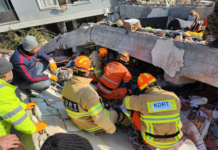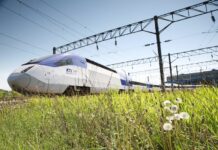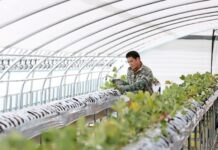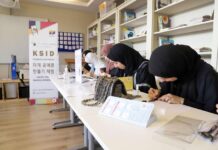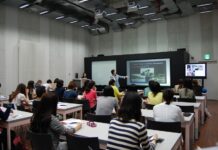
Do Jongwhan (right), minister of culture, sports and tourism, and Andres Sanchez Braun (left), a reporter from Agencia EFE, shake hands at the Seoul Foreign Correspondents’ Club (SFCC) Press Conference, in Seoul on April 17.
By Hahm Hee-eun
Photo = Heo Man-jin, Ministry of Culture, Sports and Tourism
Seoul | April 18, 2018
Just 10 days before the historic 2018 Inter-Korean Summit, foreign press gathered to attend a press conference at the Seoul Foreign Correspondents’ Club held at the Korean Press Center in Seoul.
Do Jongwhan, minister of culture, sports and tourism, who visited Pyeongyang with the art troupe on April 1, shared his experiences in Pyeongyang and his thoughts on prospects for art and cultural exchanges between the two Koreas. Thirty-five media agencies from 15 countries participated in the event, including NBC, the Washington Post, Reuters, Frakfurter Allegemeine Zeitung, NHK, the People’s Daily and Xinhua News.
Foreign journalists showed great interests in the encounter between Minister Do and North Korean leader Kim Jong-un during the Pyeongyang performance.
Andrew Salmon of Asia Times quoted former British Prime Minister Margaret Thatcher on her impression of Mikhail Gorbachev, leader of the former USSR. He asked if chairman Kim Jong-un could be a man we can “do business with.”
Minister Do responded that since he got to meet Kim in person, he noticed that he was quite different from the impression he received from descriptions in the media. He said, “Chairman Kim was able to lead the conversation in a humorous and smooth way.” Minister Do added with positive prospects for the upcoming inter-Korean summit that, “He gave me an impression that he took care of everything in detail, from small to big. Also, his way of making conversation was very straightforward.”
Foreign journalists seemed fascinated to hear that Do’s impression of Kim was unlike the usual expectations, and asked for a more detailed explanation. Sakurai Norio from the Sankei Shimbun asked for the most impressive quote that the minister had heard from Kim. Minister Do replied that, “Chairman Kim said that the theme ‘Spring is Coming’ is really nice. He also said that he wanted to create fruitful results together so that there could be another performance with the theme ‘Autumn has Come’ in Seoul.”
In particular, the minister emphasized the symbolic meaning of Kim’s words. “There’s deep meaning conveyed in the expression ‘Autumn has come.’ It’s different from ‘Autumn is coming.’ By using this expression, I understood that Kim has the willingness to resolve the remaining problems of the two Koreas in the future.”

Minister of Culture, Sports and Tourism Do Jongwhan talks about his trip to Pyeongyang and about prospects for exchanges between the two Koreas, in Seoul on April 17.
Some of the journalists also asked what the Ministry of Culture, Sports and Tourism hopes to achieve through the Inter-Korean Summit.
Patrick Welter, a correspondent from the German newspaper Frankfurter Allgemeine Zeitung (F.A.Z) asked about the conditions for a successful Inter-Korean Summit. Minister Do replied that North Korea also needs to have summit meetings with the United States and China, and that therefore it’s difficult to conclude anything by just one summit meeting. “However, if the issues regarding the two Koreas are resolved in a comprehensive manner, and if the inter-Korean summit is carried out successfully, further meetings will be arranged to discuss sport exchanges,” he said.
Kwon Hyuk from Al Jazeera noted that the official English website for the Inter-Korean Summit says that the most important agenda item for the summit is denuclearization. He asked Minister Do’s opinion on that statement. The minister replied that, “The top agenda item at the summit is, indeed, denuclearization, and if necessary we should have multiple inter-Korean summits to reach a stage where we could sign a peace treaty. In order to fulfill this, it’s our role to open the door for cultural exchanges.”
Finally, Cheong Wa Dae said that 745 journalists from 154 media organizations spanning 29 countries have applied for press passes at the summit as of April 16. This is far surpasses the number of foreign journalists who attended the first Inter-Korean Summit in 2000, which was 543, and the second Inter-Korean Summit in 2007, which was 376.
The official English website for the Inter-Korean Summit, managed by Korea.net, can be found at the link below.
http://www.korea.net/Government/Current-Affairs/National-Affairs?affairId=656



